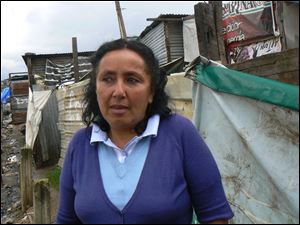
Memories of dump life hard to shake
7/4/2011
Alta Gracia, 46, says food she had found in the city dump and used to feed her children nearly killed her and her family. Now she earns a living working at a school.
GUATEMALA CITY -- Alta Gracia, wearing a clean lavender sweater and pale blue skirt, stood on a muddy field next to a row of squatters' shacks in a ghetto next to the city dump.
"Thank you for coming to see reality," she said, fighting back tears. "Most people go to the nice places. They don't see this."
Mrs. Gracia works at the Francisco Coll School, earns a regular income, has enough food to eat, and lives relatively comfortably.
She said with pride that her seven children all graduated from the Coll grade school, where her oldest daughter now teaches first grade. Her 19-year-old son is about to graduate from high school and plans to be an architect.
But the piercing reality of extreme poverty and hunger is never far away.
When Mrs. Gracia walks through the ghetto, painful memories come flooding back.
Now 46, she said she had all seven children by the time she was 26, all one year apart. Her husband, now dead from cancer, used to beat her and rape her, she said.
For 10 years, Mrs. Gracia worked in the city dump, scouring through tons of trash for plastic, glass, and other recyclable materials.
Unable to feed her children, she was afraid to have any more and borrowed $50 for sterilization surgery -- without her husband's knowledge.
She often took home less than a dollar a day, she said. "I remember wearing boots, being all dirty, looking for food for my children."
Life could hardly have been more miserable, she said.
"I used to crave meat, but the only thing I could buy was tortillas and a piece of butter. I wouldn't eat so I could feed the children," she said.
"I used to wonder, 'God, I would like to eat a tortilla myself. I work all day long. When will this change?' "
The only beverage she could give her children was water, "perhaps with a little sugar."
Then one day, 20 years ago, when Mrs. Gracia was three months pregnant and scavenging through the garbage, she found a clear plastic jar containing abobado -- pork marinated in red sauce.
It looked clean, she said, so she took it home, scraped off the sauce, and put some on a tortilla for herself.
She chopped the pork into little pieces and put it on tortillas for her children.
What Mrs. Gracia didn't know was that the meat had been poisoned to kill dogs.
It nearly killed her whole family.
"I was in the national hospital for six months. My children were hospitalized for three months," she said.
She came out of her coma when she went into labor, the birth pangs jolting her back to consciousness.
"From that moment, I feel I have come back to life," she said. "It was like I was dead, but now I am alive."
Fifteen years ago, Mrs. Gracia landed a job cleaning at Coll school. Over time, she became the person who prepares meals for the 328 students. She also does "a thousand other things" at the school founded and run by International Samaritan.
When she was released from the hospital, she said. she asked her children how they survived without her.
"The children replied that they were happy in the hospital because they had a bed and Jell-O, which they had never tasted before," she said. "And they did not have to beg for anything. They could sleep well and eat well."
Now, Mrs. Gracia makes it a point to prepare Jell-O for children of dump workers who attend the school.
"It breaks my heart to remember that my own children were very happy to taste Jell-O for the first time," she said.
Although it saddens her to remember all the things that happened to her, at the same time she said she is happy to have escaped life in the dump.
Her salary at the school is below minimum wage, she said, but at least the income is regular and dependable.
"It's never enough, never enough," Mrs. Gracia said. "But at least I have enough money for beans, and I have more than I ever had. I am thankful."
Every time she walks by the dump or the ghetto, it seems like only yesterday that this was her world.
It's hard for her to see other people in the same circumstances that she faced, especially little children all wet and dirty, crying and looking for something to eat.
"I have not been able to work it out and leave it behind. I think I will never leave it behind," Mrs. Gracia said.
PHOTO GALLERIES:
Life in Guatemala City Ghettos
St. John's Visit to Guatemala Schools
RELATED ARTICLES:
Guatemalan laborers get help from Toledo, 7/3/11
St. John's students serve as role models, 7/3/11
Strides made in improving worker' health, safety, 7/3/11